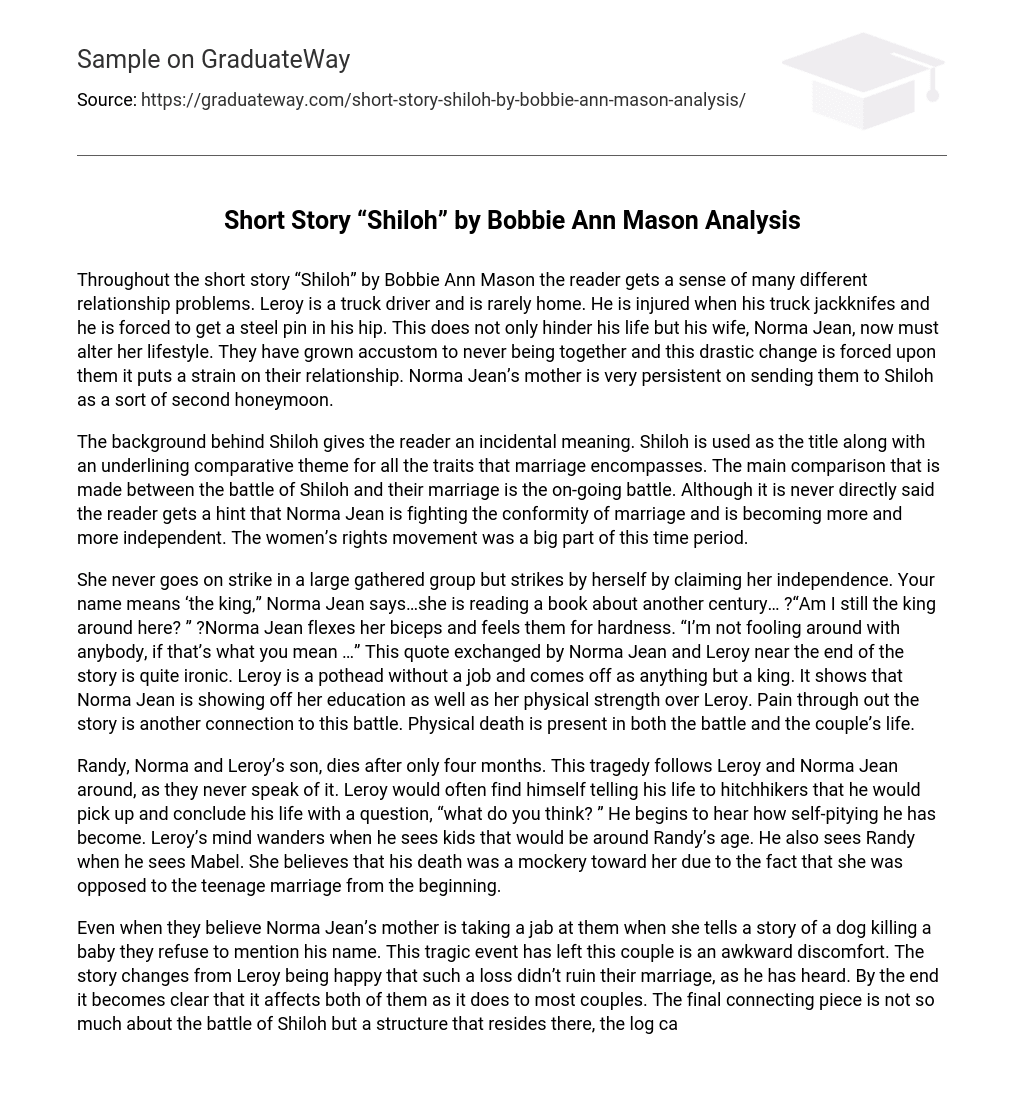In the short story “Shiloh” by Bobbie Ann Mason, the reader is exposed to various relationship issues. Leroy, a truck driver, is often away from home. However, his life takes a turn when he sustains an injury from a truck jackknifing incident, leading to the insertion of a steel pin in his hip. This not only affects Leroy, but also compels his wife, Norma Jean, to adjust her lifestyle. As they have become accustomed to being apart, this sudden change strains their relationship. Moreover, Norma Jean’s mother persistently suggests that they go to Shiloh as a form of a second honeymoon.
Shiloh is a significant background that adds significance to the story. It serves as the title and symbolizes the ongoing struggle within the marriage. Norma Jean, the protagonist, subtly resists conforming to traditional marriage roles and seeks greater independence. This theme echoes the larger context of the women’s rights movement during that era.
Norma Jean never participates in group strikes, choosing instead to assert her independence through individual action. The significance of her name, meaning “the king,” is not lost on her as she delves into a book set in a different era. With a hint of sarcasm, she questions Leroy, “Am I still the king around here?” Demonstrating her fortitude, she flexes her biceps to gauge their strength. Norma Jean asserts that she is not engaging in any idle games, subtly challenging Leroy. This conversation between them near the story’s conclusion is ironic, highlighting Leroy’s lack of ambition and substance as compared to his self-proclaimed kingly status. Additionally, it underscores how Norma Jean showcases both her intellect and physical prowess. The story depicts pain as another theme tying into this power struggle, with physical death serving as a parallel in both the battle and the couple’s tumultuous relationship.
Randy, Leroy and Norma Jean’s son, sadly dies at the young age of four months. This tragic incident deeply affects Leroy and Norma Jean, who choose not to talk about it. Leroy often shares his life story with hitchhikers and concludes by asking for their thoughts. Through these interactions, he realizes that he has allowed self-pity to consume him. His mind wanders when he comes across children who would be around Randy’s age or when he encounters Mabel. Mabel believes that Randy’s death was a form of mockery towards her because she had always opposed the teenage marriage.
Even though they believe Norma Jean’s mother is criticizing them when she tells a story about a dog killing a baby, they refuse to mention the dog’s name. This tragic event has left this couple in an uncomfortable situation. The perception of Leroy’s initial happiness that the loss didn’t ruin their marriage evolves throughout the story. Ultimately, it becomes evident that the tragedy affects both of them, as it does most couples. The final connection in the narrative is not centered around the battle of Shiloh, but rather a specific structure located there – the log cabin. Building this cabin is Leroy’s ultimate dream for his wife.
Despite the widespread belief that this cabin is not practical and Norma Jean has no interest in it, Leroy views it as a symbolic representation of their marriage. Despite facing discouragement from others, he remains determined. Critics argue that it is uncomfortable, new developments would impede its construction, and it would be too costly. Nevertheless, Leroy persists in his aspiration to own the cabin, mirroring his refusal to abandon his marriage. During a visit to Shiloh where he encounters an original log cabin, Leroy remarks, “That’s not exactly the kind of log house I envision,” yet it still resonates with his yearning for a log structure.
Leroy cannot deny the fact that his marriage is akin to an empty box, despite his efforts to convince himself and others otherwise. This realization deeply impacts him, particularly as it shatters his dream of a cabin and mirrors the deterioration of his marriage. Norma Jean’s words, which explicitly state her desire to leave him, make it evident that she wishes to terminate their relationship. Since the beginning, their relationship has deviated from normalcy. Just when they start seeing hints of normality, Leroy returns home only to discover that Norma Jean does not reciprocate his love. Persistently, Mable proposes that the young couple embark on a trip to Shiloh, almost as if it were another honeymoon.
Norma Jean is shocked and appalled by this, but ultimately agrees to go to Shiloh. Mable sees Shiloh as the place that rekindled her love with her husband and hopes it will do the same for Norma Jean. However, for this couple, Shiloh represents everything that is wrong with their marriage and triggers their worst issues. Norma Jean expresses her desire to leave Leroy in order to become more independent. Leroy, seemingly unaffected, responds by saying “no, you don’t.” However, deep down, he knew that her love never truly belonged to him. Just as Shiloh claimed many lives in 1862, it would now claim their marriage.





